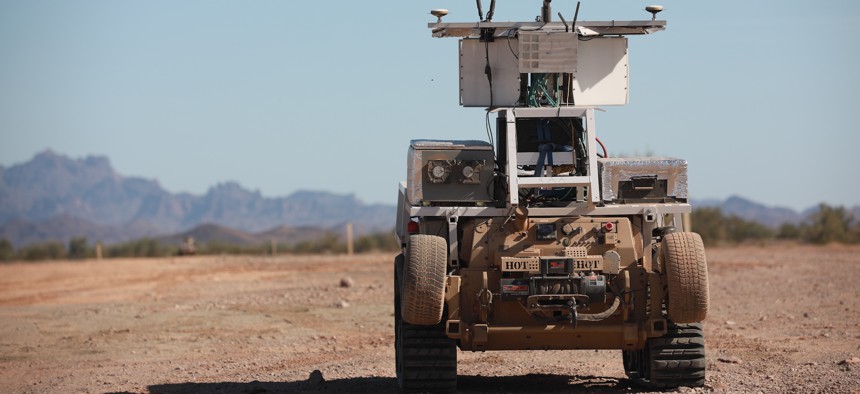US and allies test robotic vehicles in electronic warfare environments

A robotic combat vehicle goes through its paces at a 2021 exercise at the Yuma Proving Grounds in Arizona. U.S. Army photo by Spc. Destiny Jones
A test conducted by the United States, the United Kingdom and Australia subjected robotic ground vehicles to electronic warfare attacks to identify and address vulnerabilities.
The Department of Defense announced this week that scientists from the United States, the United Kingdom and Australia conducted tests of robotic vehicles late last year as part of a trial to pinpoint weaknesses in autonomous systems operating in electronic warfare environments.
The tests were collaboratively carried out in late 2023 under the Australia-U.K.-U.S. — or AUKUS — security and technology partnership, which seeks, in part, to advance the countries’ use and adoption of emerging technologies.
The Pentagon said in a Monday press release that the “Trusted Operation of Robotic Vehicles in a Contested Environment” — or TORVICE — trial involved robotic ground vehicles from the UK and U.S. that had been configured “to represent autonomous multi-domain launchers and uncrewed ground vehicles conducting long range precision fires and associated missions.”
The vehicles, which reportedly did not carry any weapons during the tests, were then subjected to “electronic warfare, electro optical and position, navigation and timing attacks” by Australian scientists at the testing site in South Australia.
The Australian Department of Defence said in a Tuesday statement that the trial “successfully demonstrated the integration of advanced autonomy and artificial intelligence to test the resilience of autonomous assets in a contested environment.”
The AUKUS partners previously conducted an artificial intelligence and autonomy trial in the UK in April that tested “AI-enabled assets in a collaborative swarm to detect and track military targets in a representative environment in real time.”
Kimberly Sablon, DOD’s principal director for trusted artificial intelligence and autonomy, said the TORVICE trial built upon last April’s test and allowed the partners to perform “rigorous red teaming of our autonomous/AI systems to assess and mitigate vulnerabilities and to improve their resilience in contested and complex environments."
The recent trial comes as the AUKUS partners continue to focus, in particular, on the impact of electronic warfare on autonomous systems and other emerging technologies.
During an event at the Center for Strategic and International Studies in January, Michael C. Horowitz — deputy assistant secretary of defense for Force Development and Emerging Capabilities — said the Defense Innovation Unit would be leading a series of innovation challenges with AUKUS partners this year in which “each country is going to launch the same innovation challenge focused on electronic warfare so we can all benefit from the research that companies in all three countries are doing on that topic.”
Horowitz’s comments came after Defense Secretary Lloyd Austin announced in December that the innovation challenge series would allow companies from all three AUKUS nations to compete in “a prize challenge focusing on electronic warfare.”






